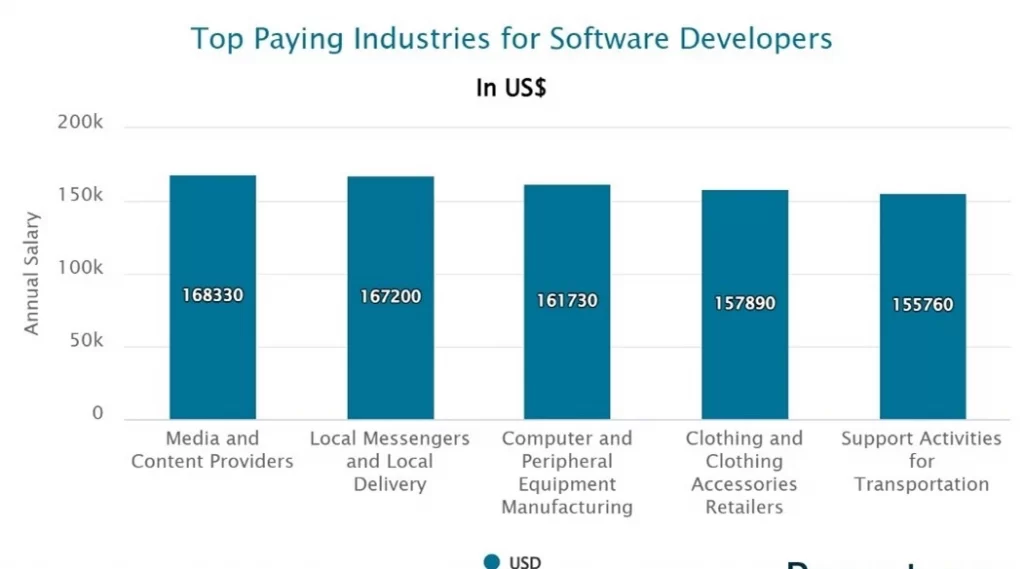
Have you seen The Social Network way too many times and gotten absolutely excited about the complexities and charm associated with building software? If yes, then it Is absolutely safe to say that you have chosen the right career. Being a software developer is all about taking your passion and turning it into innovation. And software development is all about designing and creating software programs. So basically, it’s a match made in heaven. However, pursuing a career in software development is a long journey as it includes education, training, and qualifications. Understanding the necessary steps to follow to have seasoned software developer skills is vital for your success. Thus, to help reduce some burden off your shoulders, we have put together an article that will give you an awesome head start.
Fascinating Fact: A recent survey revealed that 53% of software developers wrote this first line of code at ages between 11 and 17
Before you decide to solemnly swear your loyalty towards software let’s understand why you must do it without thinking twice.

Why be a Software Developer?
Technology is taking over our daily lives at a breakneck speed, and software developers are the ones who will get to hold the steering wheel and guide everyone toward the future with innovative solutions.
Software development is the need of the hour in the modern job market. Virtually every industry is highly dependent on software technology to accentuate efficiency, make processes seamless, and improve user experience. The increasing demand for software developers means that there are a plethora of opportunities and competitive salaries that are at your disposal. So, step one, check.
Now let’s move on to understanding the steps you must take to become a software developer
General Skills for Success
First and foremost, let’s focus on some general skills that will help you excel in your roles:
A problem-solving attitude
As a software developer, your existence becomes synonymous with a problem solver. You must naturally be good at identifying complex issues, divide them into manageable tasks, and come up with effective solutions. You should be capable of critical thinking and tackle problems with a logical and systematic approach.
An analytical approach
Developers must at all times analyze needs, comprehend user requirements, and assess different solutions. They should be natural at thinking analytically, identifying patterns, and making accurate decisions based on evidence and data.
Have an Eye for Detail
Software development usually entails intricate codes, system architectures, and algorithms. Having an eye for detail ensures efficiency, accuracy, and sturdiness in coding, debugging, and testing activities.
Collaboration & Cooperation
Software development projects are very rarely a one-person job. Developers often have to work as a part of a team, collaborating with different developers, stakeholders, designers, and project managers. Commendable teamwork and collaboration are a must when working closely, sharing knowledge, and contributing to a unified and result-driven environment.
Constant Learning
If you venture into the world of software development, understand the fact that it involves lifelong learning. Developers should always have a learning attitude and growth mindset. Keeping up with the industry trends, experimenting with the latest technologies, and enhancing your skills will help you thrive and succeed in your field.
Practice
When it comes to coding and programming, constant practice is what will put you in the driving seat. Dedicate a lot of time to working with programming languages, and building programs and apps. This constant practice will help you become more productive, accurate, and a bankable professional. It will not only improve your programming and coding skills but also help you stay up-to-date with the latest technological advancements. Try searching for guided software development projects online to complete as a kind of practice. You can later add this to your portfolio. Some of the practice work includes:
- Developing a basic HTML5 website
- Developing your own app
- Building a game
Being adaptable
The vistas of the software industry keep changing every second day. It is constantly developing with new technologies, best practices, and frameworks. Developers should always be on their toes and be open to learning new concepts, technology trends, approaches, and tools.
Technical Skills
First Station; Qualification
The first step is to always get lay a strong foundation and that is done by acquiring the right qualifications. Acquiring the relevant qualification showcases your aptitude and understanding of software development topics to relevant organizations. You can go about getting your qualification in three ways:
Degree to the Rescue
Receiving a degree in software development or an associated field is the most straightforward route to becoming a software developer. You can opt for computer science, financial technology, maths, software engineering, or information technology. These courses normally span over a time of three or four years. Every university has its own entry requirement for giving access to such courses. You need to ensure that you have at least one or two A-levels or corresponding for a higher national diploma or foundation degree, and two to three A-levels or corresponding for a full degree course. Earning a degree is a sure shot way to attract more job opportunities and improve your technical skills.
Take Up a College Course
Enrolling in a college course about software development or a related topic is a smart and quicker alternative to attending university. Generally, you should be able to finish the college course in two years and start receiving all the experience needed to become a bonafide software developer. Some of the courses that you can opt for include:
- A-level in computing
- T level In Development, Design, and Digital Production
- Level 3 Certificate in Programming
- Higher National Certificate in Computing
Self-education
There is no absolute requirement for a degree or a diploma to be a qualified software developer. Till the time you are well-versed in programming languages and have experience with certain programming skills, you are good to go in the search of a career in software development. Opt for a free course in any of the corresponding software development subjects and learn coding and programming by yourself with the help of online resources. Listed below are some examples of languages and skills that you can add to your arsenal:
- Smalltalk
- HTML
- C++
Achieve a More Advanced Qualification
Software development is an extremely technical field, which expects professionals to have advanced coding and programming knowledge and credentials. Thus, it will always be beneficial to complete a more advanced qualification after you receive your degree, complete your college curriculum, or self-educating. Some of the ways you can achieve advanced qualification is by:
- A graduate training scheme
- A higher apprenticeship
- A trainee position with an organization
Choose the Path of Your Calling
Once you become a software developer, you become capable of offering various specializations. Consider the below-mentioned paths:
- Front-end Development: Design and develop user interfaces that engross audiences
- Back-end Development: Emphasize server-side functionality and data processing
- Full Stack Development: Become capable of developing both client and server-side software
- Mobile Development: Design applications for iOS, Android, or cross-platform solutions
- Game Development: Take over the world of gaming and interactive experiences.
Create a Portfolio
After you are done with training, apprenticeship, and narrowing down on your choice of specialization, it’s time to build a portfolio that includes your software development work. Begin with developing different applications and creating software programs that bring out your coding and programming skills. Gather them all in a portfolio to give the employers a look into your knowledge and skills and convince them that they are the right person for the job. You must also include some of the work you undertook during your apprenticeship or trainee position. As you keep gaining skills and experience, ensure that your portfolio only shows your top jobs.
Go On Your Job Hunt
Once your portfolio is in place, it’s time to start the job hunt. There are a ton of numerous software developer vacancies posted on online job websites like jobsbuster, social media pages, and recruitment organizations. You can also directly approach the website of organizations that you wish to be a part of. Ensure that you submit your portfolio to display your work which in turn will help the employers in making an informed choice. If you are currently not looking for full-time employment, you can start by working as a freelancer or look for remote jobs online.
Other Job Opportunities in the Field
Let’s also look at some other job opportunities that will open up for you once you become a software developer:
DevOps Engineer
DevOps engineers are the ones who are responsible for bridging the gap between software development and operations, keeping their eyes on automation, and ensuring that all processes are streamlined. They focus on continuous integration/continuous deployment (CI/CD), deployment pipelines, and infrastructure management.
Data Scientist
Thanks to your commendable analytical and programming skills, you can also transition towards data science roles. The major role of data scientists is to analyze and interpret complex data and derive insights, develop algorithms to initiate data-driven decision-making and build predictive models.
Information Security Analyst
Software developers can be a natural when it comes to cybersecurity, where they focus on securing computer systems and networks. Your duty would be to analyze vulnerabilities, come up with security measures, and design software solutions to safeguard against cybercrime.
UX Designer
Software designers who have a penchant for design and user experience can hunt for roles in UX (user experience) design. You would be collaborating with design and stakeholders to give birth to intuitive and visually attractive software interfaces
Technical Consultant
Software developers can make the most of their acquired skillset and venture into the world of technical consultants. You can help clients understand the best software development practices, technology implementation strategies, and system architecture.
Read Also: Getting Ready for the Future: 10 Engineering Trends in 2023
Conclusion
To sum it up, just like other skills, you should take baby steps to familiarise yourself with the generic programming concepts. Then, steadily with time head toward real-life programming examples with some assistance. A well-laid-out course that is strategically put together keeping in mind the challenges of the first-time programmers will be of great benefit as you learn to program. You are choosing a dynamic and promising career path, and with the above article we have put together all the necessary information you would need to get started and make your way to the top. So irrespective of whether you are a novice or a seasoned coder, the above-mentioned steps will put you on the right path.